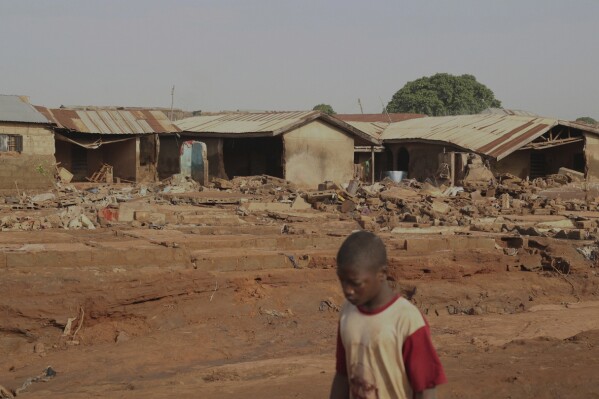

MOKWA, Niger State, Nigeria — A catastrophic flash flood struck Mokwa on May 29, sweeping away homes, schools, and lives—including those of a local Islamic teacher, his family, and dozens of young pupils.
The disaster, triggered by relentless rainfall over the course of five hours, caused water levels to rise unexpectedly fast in the absence of drainage infrastructure. It claimed more than 200 lives, with over 1,000 people still missing, according to officials—though residents say the death toll may be much higher (ajc.com).
Religious instructor Mallam Hassan Umar found himself waist-deep in floodwater, watching in horror as his Arabic school, also his residence, was submerged. He clutched only the tattered clothes he escaped in while desperately calling out for the pupils he had sheltered (ajc.com).
One of his former students, Haruna Yusuf, lost 14 relatives and 12 Almajiri pupils under his care. Yusuf recounted the harrowing loss of his brother, Islamila, who drowned while trying to save children.
“He did not make it out again… he was consumed by the water, while trying to save others,” Yusuf said (ajc.com).
In nearby Rabba, the collapse of a key bridge has forced pupils of Rabba Nursery and Primary School to take perilous canoe rides across a flooded river.
Eleven-year-old Hussaina Aliyu described her fear:
“No life jackets… I’m scared, but I still try to go,” she said (ajc.com).
Attendance has dropped sharply, with many students arriving late or missing school entirely (srnnews.com).
A school has been repurposed as a displaced-person camp, though it remains largely empty due to logistical delays; many survivors are taking refuge in damaged homes or with relatives (ajc.com).
The government and UNICEF have deployed food, water, and sanitation kits to mitigate disease risks (apnews.com).
Mokwa, positioned about 380 km west of Abuja, is now enveloped in grief as the flood highlights Nigeria’s susceptibility to extreme weather exacerbated by climate change, inadequate drainage, and insufficient disaster preparedness (ajc.com).
| Impact Area | Status |
|---|---|
| Fatalities | Officially over 200; estimated actual toll could exceed 1,000 |
| Missing | More than 1,000 persons unaccounted |
| Schools | Bridge collapse disrupts commutes; lessons delayed or canceled |
| Relief | Food/water aid delivered; camp infrastructure remains underused |
A government spokesperson emphasized, “We are working with all stakeholders to restore infrastructure and ensure our children can resume education safely.”
UNICEF’s aid is focused on water, hygiene, and disease prevention as displaced families begin recovery efforts.
Let me know if you’d like support creating an infographic, sourcing photos, or preparing optimized metadata for this post.